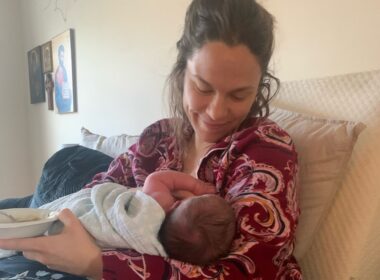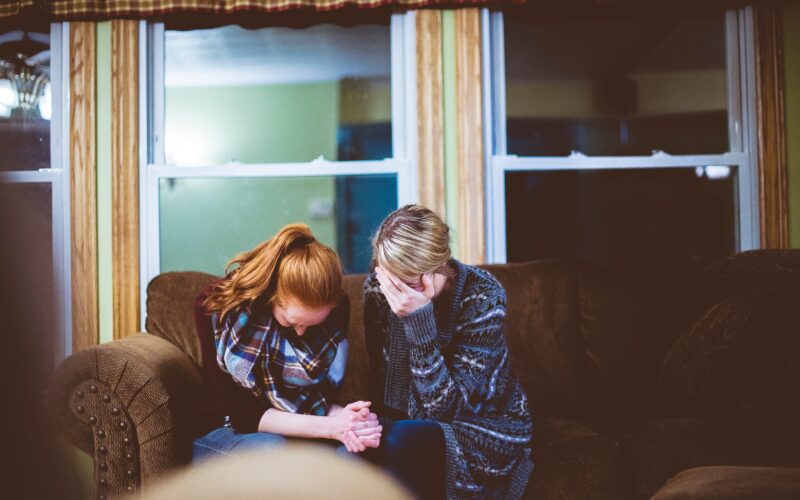(This article discusses pregnancy loss and may not be appropriate for some readers because of the sensitive content. If you are struggling with a pregnancy loss, this article may be difficult to read.)
It’s the unspoken grief that so many women carry in their hearts: the pain of losing a child due to miscarriage. While it is often only talked about in hushed voices behind closed doors and is sometimes treated as a taboo subject, miscarriages are, unfortunately, not rare. They happen in about 10 to 25% of pregnancies, according to the March of Dimes. This means that many women experience the physical and emotional pain of pregnancy loss but feel unsure of how to talk about their loss or how to grieve because this is a topic that is not discussed enough.
New research has found that women who have experienced an early miscarriage or ectopic pregnancy are at risk for depression, anxiety, and post-traumatic stress for at least 9 months after the event. This proves that the emotional trauma of miscarriage—no matter how early it may occur—is real, and that it may last much longer than previously thought. And although more and more women are sharing their stories of pregnancy loss at every stage, from miscarriages to stillbirths, it can still feel difficult to discuss or share for many women.
Additionally, there can be a lack of understanding on the part of others which can make the experience of sharing even more challenging. Raising awareness of the reality of pregnancy loss and the physical and emotional struggles mothers experience is crucial to helping women who’ve experienced a miscarriage feel supported and cared for during what can be an incredibly difficult experience both emotionally and physically.
What is a miscarriage?
According to the American College of Obstetricians and Gynecologists (ACOG), miscarriage is defined as the loss of a pregnancy during the first trimester. Most miscarriages occur before the 12th week, while about 1-5 percent of miscarriages occur in the second trimester. Signs and symptoms of pregnancy loss include bleeding from the vagina or spotting, cramps similar to menstrual cramps, and severe belly pain. (Women who are experiencing these symptoms or who are concerned about the possibility, should contact their health care provider.)
What causes a miscarriage?
Although it depends on each individual woman’s experience, many feel a sense of guilt and blame themselves for the pregnancy loss. They may go over the events of the recent weeks, searching for a reason why the miscarriage happened. They often fear that the heavy box they lifted or the exercise class they took was the causal factor. However, the reality is, there are many factors completely outside the mother’s control that may have contributed to the pregnancy loss.
For example, according to the American Pregnancy Association, about 50-75% of all miscarriages occur right after implantation, which is sometimes called a “chemical pregnancy.” Additionally, the ACOG estimates that about half of cases of miscarriages are caused by an abnormal number of chromosomes. So, often, there are circumstances completely outside of the mother’s control that contribute to the loss of the pregnancy.
If you or someone you know is experiencing feelings of guilt or blame for the miscarriage, it can be helpful to talk to a healthcare professional to see if you are able to identify why the miscarriage occurred to help you alleviate feelings of guilt. Additionally, you or your loved one may find it helpful to talk to a counselor to help you address those feelings of guilt, blame, or shame.
What puts me at risk for a miscarriage?
There are several factors that could increase a woman’s risk for having a miscarriage including:
- Having two or more previous miscarriages
- Being 35 or older
- Smoking, drinking alcohol, or using harmful drugs
- Being exposed to harmful chemicals
- Autoimmune disorders (lupus, antiphospholipid)
- Obesity
- Hormone issues like PCOS or low progesterone
- Preexisting diabetes
- Thyroid problems
The presence of one or more of these risk factors does not necessarily mean that a pregnancy loss will happen, but it may increase the chances of it occurring. Your healthcare provider can help you assess your personal risk.
What are the emotional effects of miscarriage?
While every woman copes with the physical and emotional effects of a pregnancy loss in her own way, many women go through a grieving process. They are mourning the loss of the baby as well as their hopes and dreams for that pregnancy. This grief is very normal regardless of how far along the woman was in her pregnancy. In other words, the degree to which a mother experiences a loss is not proportional to how far along she was in the pregnancy. Instead, each woman grieves differently according to what the pregnancy meant to her.
Processing the loss and grieving takes time and the emotional pain can often last longer than the physical pain experienced due to a pregnancy loss. The American Psychological Association (APA) reports that experiencing a pregnancy loss increases a woman’s risk for developing depression, anxiety, and postpartum depression. In one study, about 15 percent of women developed depression and/or anxiety for up to three years after the pregnancy loss occurred.
Because the pain of grief and loss and the risk for developing depression and anxiety is very real, it is crucial that those who have suffered miscarriage seek the support of a trained mental health professional to address any symptoms and process grief healthily. Additionally, it is important to surround oneself with supportive family and friends to help heal during this difficult time.
There is hope for healing after a miscarriage, and with the help of targeted hormone testing and treatment, there may even be hope for some women in the prevention of future miscarriage. Both will take time and may feel overwhelming, but those who have suffered miscarriage deserve to have their health concerns taken seriously, and to be able to acknowledge their loss and to grieve in whatever way is best for them.







